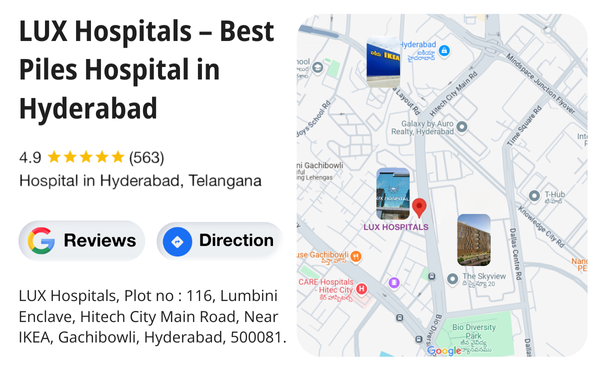Best Piles Treatment in Hyderabad
- Laser + Harmonic Procedure
- 10,000+ Piles Patients treated
- 30 Minutes, Same day discharge
- All Cashless Insurances Accepted
- Have Insurance? Pay ZERO
- Interest Free EMI Options Available

Why Lux Hospitals?
| Overall Points | Other Hospitals | Lux Hospital |
|---|---|---|
| Insurance | 80-85% Coverage |
100% COVERAGE |
| Co-Pay | 10-15% of Cost |
0% CO PAY |
| Sterilization | Autoclave / ETO | PLASMA STERILIZATION |
| Rooms | Sharing / Single Room |
SUITE ROOM |
| Cost | Variable | FIXED |
Our Doctors

Dr. Samhitha
MBBS, MS, FMAS, FISCP, DMAS
Consultant General & Laparoscopic Surgeon
Speciality : Piles
Experience : 8 years

Dr. Abhishek Katha
MBBS, MS, FMAS, FISCP, DMAS Consultant General & Laparoscopic Surgeon
Speciality : Piles
Experience : 15 years
| Other Hospitals (Laser Treatments) |
Lux Hospital (Laser+Harmonic Treatment) |
|
|---|---|---|
| Cuts | Minimal | None |
| Scars & Stiches | Minimal | None |
| Blood Loss | Low | Negligable |
| Recurrence Chance | 5-10% | 0-1% |
| Recovery | 24-48 Hours | 12-24 Hours |
| Hospital Stay | 24 Hours | 6-12 Hours |
Best Piles Treatment at Lux Hospitals
Check insurance coverage
Find out if Piles treatment is covered in your insurance policy or not.

Have Insurance?
Check insurance coverage
Find out if Piles treatment is covered in your insurance policy or not.

Check insurance coverage
Find out if Piles treatment is covered in your insurance policy or not.

| Other Hospitals(Laser Treatments) |
Lux Hospital (Laser+Harmonic Treatment) |
|
|---|---|---|
| Cuts | Minimal | None |
| Scars & Stiches |
Minimal | None |
| Blood Loss |
Low | Negligable |
| Recurrence Chance |
5-10% | 0-1% |
| Recovery | 24-48 Hours |
12-24 Hours |
| Hospital Stay | 24 Hours |
6-12 Hours |
Best Piles Treatment
at Lux Hospitals
Patient Talks
Get treatment estimation
Piles Treatment cost depends on type of procedure, severity of disease and post medical condition.

What Are Piles / Hemorrhoids?
Piles, or hemorrhoids, are swollen blood vessels in the rectum or anus that can cause pain, itching, bleeding, and discomfort, particularly during bowel movements.
Top 3 Advanced Treatments for Piles at Lux Hospitals:
A highly effective, minimally invasive procedure that uses laser energy to shrink and seal off hemorrhoids. This treatment reduces pain, offers faster recovery, and minimizes the risk of recurrence.
A modern, non-surgical technique where a Doppler ultrasound is used to identify and tie off hemorrhoidal arteries, cutting off blood flow to the hemorrhoids and causing them to shrink.
A combination of hemorrhoid artery ligation with a repair of the rectal mucosa, designed for more advanced hemorrhoids. This minimally invasive method preserves the anal cushions and promotes healing with less post-operative pain.
Frequently asked Questions
What are the common symptoms of piles/hemorrhoids?
Experience pain, itching, and discomfort around the anal area? Consult our specialists in Lux hospitals, Hyderabad for effective piles treatment options.
Looking for non-surgical piles treatment in Hyderabad?
Explore our hospital advanced non-surgical options for piles treatment, ensuring minimal pain and quick recovery. Our specialist doctor try their best to avoid surgery for piles treatment.
How to prevent piles recurrence after treatment?
Our expert doctors at lux hospitals provide personalized post-treatment care tips and guidance to reduce the chances of piles returning.
Are there specialized piles treatments for pregnant women?
Yes, our expert female doctors at Lux hospitals offer unique treatment options to pregnant women considering the safety of the mother as well as the child.
Expecting mothers with piles problem can contact our female surgeon Dr Samhitha Reddy.
What sets our Lux hospital for piles apart?
Our Lux hospitals combines cutting-edge technology, experienced specialists, and compassionate care to provide the best possible outcomes for piles patients.
Contact Us:
Lux hospitals
Plot No. 116, Lumbini Avenue, Gachibowli, Near IKEA, Hyderabad, 500081.
Email: care@luxhospitals.com
Website: www.luxhospitals.com
© Lux HospitalsTM. All rights reserved.
Disclaimer:
The results and experiences may vary from patient to patient.
By submitting the form, you agree to receive important updates and marketing communication.





 Chat on Whatsapp
Chat on Whatsapp